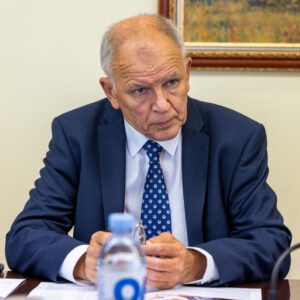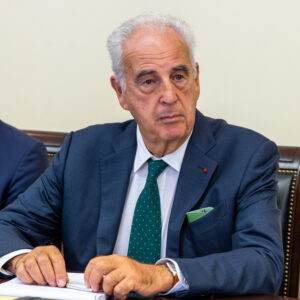During September 11 – 13, an official delegation of the Eastern and Central European and Central Asian Commission on Drug Policy (ECECACD) visited Moldova in order to create a meaningful dialogue with the authorities, to provide support and share experience in building a humane drug policy.
This is a landmark event for the country, as the visit aims to promote evidence-based approaches to drug policy at the highest level. Significantly, the ECECACD members who are inspiring the open discussion are a group of high-level leaders, including former heads of state, politicians, scientists, diplomats and philanthropists from the region.
 Vytenis Andriukaitis, Commissioner, WHO Special Representative for the European Region, former EU Commissioner for Health and Food Safety emphasized that Moldova now has a unique opportunity to change the balance between law enforcement and the health sector: “Moldova has a great momentum and windows of opportunity—that is EU accession perspective. That is a unique moment when all legislation, including laws on drugs, need to be reviewed and changed in accordance to the EU requirements and standards. Government needs to use this opportunity to introduce progressive, evidence-based and human rights oriented approached to drug policy, to change the balance between law enforcement and healthcare sectors. Drug policy should be designed at the high political level as it is a multi-sectoral issue. The National Anti-Drug Commission should resume its work under the Cabinet of Ministers, but not under the Ministry of Internal Affairs. Proper management and funding should be ensured to make it work effectively. »
Vytenis Andriukaitis, Commissioner, WHO Special Representative for the European Region, former EU Commissioner for Health and Food Safety emphasized that Moldova now has a unique opportunity to change the balance between law enforcement and the health sector: “Moldova has a great momentum and windows of opportunity—that is EU accession perspective. That is a unique moment when all legislation, including laws on drugs, need to be reviewed and changed in accordance to the EU requirements and standards. Government needs to use this opportunity to introduce progressive, evidence-based and human rights oriented approached to drug policy, to change the balance between law enforcement and healthcare sectors. Drug policy should be designed at the high political level as it is a multi-sectoral issue. The National Anti-Drug Commission should resume its work under the Cabinet of Ministers, but not under the Ministry of Internal Affairs. Proper management and funding should be ensured to make it work effectively. »
Important points of the visit were the exchange of experiences and analysis of the impact of drug policy on development, health and human rights in Moldova. Special attention was paid to discussing decriminalization of people who use drugs, as well as possible changes in the country’s drug policy taking into account European integration.
 “Moldova has been a leader on implementing best practices to respond to HIV in the EECA region, in particular by pioneering harm reduction services in prisons. However, legislative barriers continue to limit the effectiveness of prevention and treatment programs. First, the registry of people who use drugs under the Ministry of Health that limits people’s access to services. Second, the lack of clarity on what is the best standard of treatment for opioid dependence, detox continuing to be offered as first option for treatment rather than opioid agonist therapy (OAT). Only 5% of eligible people have access to this kind of treatment. It is urgent for Moldova to review its policies and move towards broader access to treatment,” said Prof. Michel Kazatchkine, member of ECECADC.
“Moldova has been a leader on implementing best practices to respond to HIV in the EECA region, in particular by pioneering harm reduction services in prisons. However, legislative barriers continue to limit the effectiveness of prevention and treatment programs. First, the registry of people who use drugs under the Ministry of Health that limits people’s access to services. Second, the lack of clarity on what is the best standard of treatment for opioid dependence, detox continuing to be offered as first option for treatment rather than opioid agonist therapy (OAT). Only 5% of eligible people have access to this kind of treatment. It is urgent for Moldova to review its policies and move towards broader access to treatment,” said Prof. Michel Kazatchkine, member of ECECADC.
During the working visit, the commissioners met with the Prime Minister of the Republic of Moldova, Dorin Recean: as well as with the Moldovan Government. The following issues were discussed during the official working meetings:
- Increasing the borderline sizes of narcotic drugs for possession without the purpose of sale, which are criminalized. And as the next stage – decriminalization of possession without the purpose of sale
- Abolition of drug registration as a discriminatory practice against people who use drugs.
- Increasing access to OAT. Today, less than 5% of those in need take OAT.
Also, the European integration perspective imposes on Moldova the obligation to harmonise the legislation with the European norms and standards, including those related to human rights and access to justice. In addition, there were important issues on the agenda such as an overview of the situation in the region and the specifics of the situation in Moldova, plans for 2024 and current work, as well as a series of meetings with representatives of civil society, state institutions and public organisations, representatives of KAP Moldova (committee of key populations in the context of HIV/AIDS) and discussions with journalists.
During the series of meetings, the Commissioners presented the position paper Guiding Principles Towords Effective and Humane Drug Policies in Eastern and Central Europe and Central Asia.
During the meetings, representatives of many key ministries, the Government and Parliament expressed understanding and agreement on key issues. This suggests a promising continuation of work and cooperation in the country.
 “The Commission has a unique role—that is high-level political advocacy. They work on ‘peer to peer’ principle: they promote best standards of drug policy directly to key decision makers in the countries of the region. During country missions, they meet with Presidents, Prime Ministers, Minsters, members of Parliament, diplomats, UN agencies. It results with better understanding of needed reforms and with some political commitments from decision-makers. We continue working with the countries after visits to follow up and build on agreements. Commission provides expertise, recommendations, develops analytical papers upon requests on specific issues. It is ongoing work before and after visits,” said Olena Kucheruk, ECECACD Executive Secretary.
“The Commission has a unique role—that is high-level political advocacy. They work on ‘peer to peer’ principle: they promote best standards of drug policy directly to key decision makers in the countries of the region. During country missions, they meet with Presidents, Prime Ministers, Minsters, members of Parliament, diplomats, UN agencies. It results with better understanding of needed reforms and with some political commitments from decision-makers. We continue working with the countries after visits to follow up and build on agreements. Commission provides expertise, recommendations, develops analytical papers upon requests on specific issues. It is ongoing work before and after visits,” said Olena Kucheruk, ECECACD Executive Secretary.
This visit promises to create conditions for strengthening cooperation, improving and building humane drug policies in the region.
The organisation of the visit was supported by the Alliance for Public Health and the Global Fund, within the framework of the regional project #SoS_2.0. We’d also like to express gratitude to Positive Initiative, UNAIDS Moldova and national expert Alia Iatsko for their support in organising the visit.
The Eastern and Central Europe and Central Asia Commission on Drug Policy (ECECACD) was established in November 2021 by a group of high-level leaders, including former heads of state, politicians, academics, diplomats and pilanthropists from the region.
The creation of ECECACD was inspired by the Global Commission on Drug Policy and ECECACD works in close collaboration with it. ECECACD aims to inspire open debate and promote evidence-based approaches to drug policy across the region. The Commission focuses on the specific needs and challenges of the Eastern Europe and Central Asia region.
















